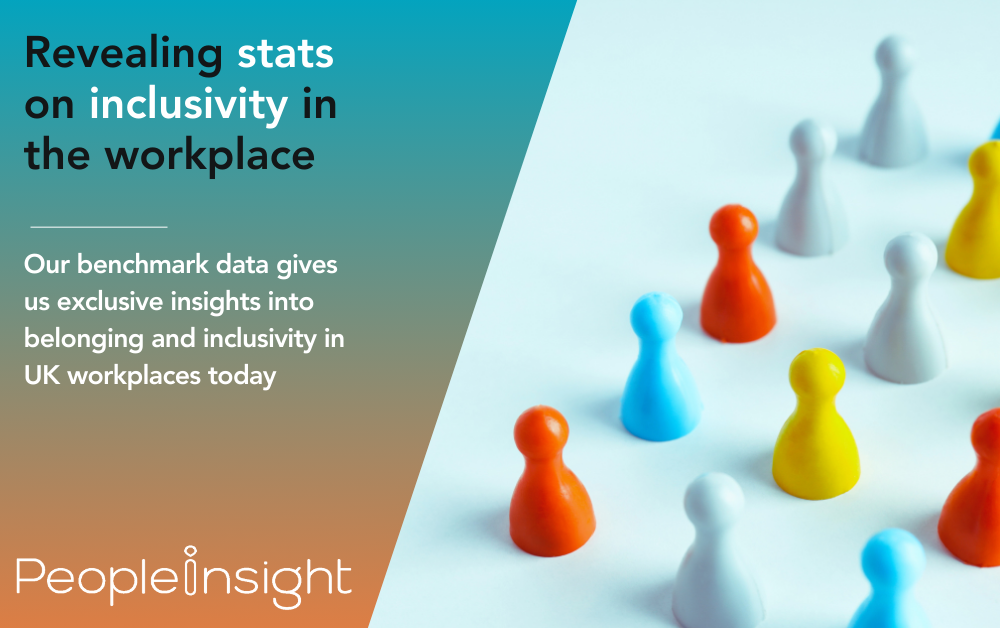
A quick insight: Inclusivity at work means creating an environment where people feel they belong, are respected and can contribute fully. It goes beyond diversity to how policies, practices and everyday interactions support fairness and participation. This post explains what inclusivity looks like, why it matters for people and performance, and practical ways to strengthen it so everyone can thrive.
Inclusivity has become a huge focus for organisations looking to attract and retain diverse talent, and for good reason. There are untold benefits of diversity and inclusion in the workplace in terms of productivity, engagement and performance.
As the workforce becomes more diverse, however, the challenge lies not only in representation but also in creating an environment where employees feel a genuine sense of belonging and respect. We delved into our exhaustive benchmark data and found persistent and concerning gaps in inclusivity, particularly for Black and Asian employees in the UK. Our data underscores the steps organisations need to take to make all employees feel valued.
Related: Download a sample of free diversity and inclusion survey questions
Inclusivity in the workplace goes beyond meeting diversity, equality and inclusion quotas; it is about creating a space where all employees feel they can bring their full selves to work. When employees feel included, they are more likely to engage with their teams and contribute effectively to organisational goals. Inclusivity includes fairness, respect and the ability to thrive irrespective of one’s background.
Our data reveals stark differences in how employees of different ethnic backgrounds perceive inclusivity. For example:
Such disparities reflect underlying challenges in creating equal opportunities and creating a culture of mutual respect.
Related: Check out these employee engagement statistics
One of the key findings is the mistrust many employees feel towards organisational processes when addressing inappropriate behaviour. While 71% of White employees say they would know how to address such situations, this drops to 65% among Black and Asian employees. What’s mroe, only 24% of Black and Asian employees feel comfortable challenging inappropriate behaviour, compared to 15% of White employees.
This mistrust can be attributed to perceived inaction or insufficient responses to past concerns raised by employees. Without visible accountability, employees are less likely to feel secure in speaking up.
Discrimination and bullying remain a significant barrier to inclusivity in the workplace.
This gap not only affects employee wellbeing but also damages your organisational culture and damages productivity in the long run.
A sense of belonging is an essential component of inclusivity in the workplace. When employees feel they belong, they are more likely to stay with an organisation and contribute meaningfully. However, our data suggests a disparity in how belonging is experienced:
These gaps highlight the need for targeted efforts to improve inclusivity from the moment an employee joins an organisation.
Related: Watch our webinar on diversity and inclusion in the workplace
Our decades of experience in the area of company culture and employee experience show us that there are three primary factors that influence perceptions of inclusivity:
Organisations that actively work on these areas are more likely to retain diverse talent and build trust with their workforce.
Related: How to manage age diversity in the workplace
The era of box-ticking approaches to diversity is over. Employees expect meaningful actions that go beyond symbolic gestures. Leadership plays a key role here — leaders must openly discuss inclusivity and champion initiatives that address inequities. By prioritising inclusivity in the workplace, organisations can create an environment where all employees feel empowered to contribute their best.
Inclusivity in the workplace is no longer optional for organisations aiming to thrive in today’s diverse society. The statistics presented show clear gaps in how inclusivity is experienced across different demographics, emphasising the need for action. By addressing barriers, acting on concerns and actively creating a culture at work of belonging, organisations can create truly inclusive workplaces where everyone feels valued.
Achieving inclusivity in the workplace is a continuous process that requires commitment, transparency and the willingness to evolve in response to employee needs. If you need help in this area get in touch for a diversity and inclusion survey today.

